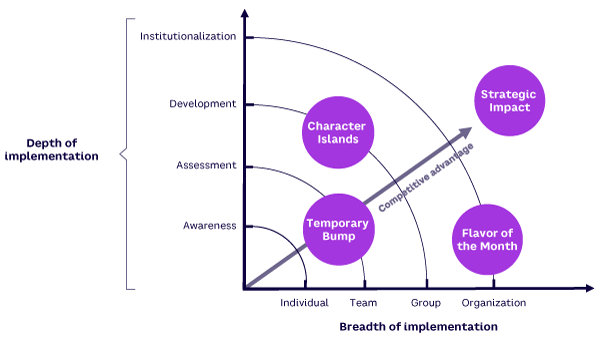A day doesn’t go by in which we don’t talk about [leader character] in some way or another.
— John Ossowski, President, CBSA
The strategic impact of leader character has the potential to improve any initiative within an organization from performance and culture to well-being and diversity, equity, and inclusion (DEI). Ossowski was an early adopter of character leadership, embedding it throughout the Canada Border Services Agency (CBSA) with the belief it would fundamentally impact the organization and the lives of those in it. As he points out, it manifests each day in conversations, decisions, and actions.
Leader Character Impact Vectors
In general, people understand what character is and why it matters but not what it takes to cultivate the habits associated with character. Without this understanding, efforts to elevate character to achieve competitive advantage at either the individual or organizational level will be compromised.
By competitive advantage, we mean that whether you are a for-profit or not-for-profit, you need to compete for time, attention, and engagement. Furthermore, the need to thrive amidst the challenges and complexities means that you have to deliver on the demands of today while simultaneously building for the future. This requires strength of character. Additionally, for character to reach its full strategic impact, it must be embedded and institutionalized across the organization.
Figure 1 shows three vectors for reaching strategic impact. Whether it be leadership development in general or leader character specifically, there is a risk of a Temporary Bump: character education is provided, but we don’t see the type of sustainable change that leads to a sustainable competitive advantage.

There are two other vectors. One is the depth of implementation that moves through awareness-assessment-development-institutionalization (vertical axis) within a small group or team to establish what we call Character Islands (spaces where character resides but are detached from other parts of the organization).
Character Islands are a good start, but institutionalization usually depends on broader implementations in which the entire organization embraces leader character to achieve strategic impact. The other vector is breadth of implementation, which involves scaling awareness by running seminars and workshops across the organization (horizontal axis). This approach runs the risk of creating a Flavor of the Month if there is no plan to permanently embed character into the organization.
[For more from the authors on this topic, see: “Cracking the Code: Leader Character Development for Competitive Advantage.”]





